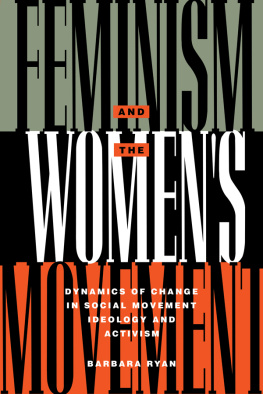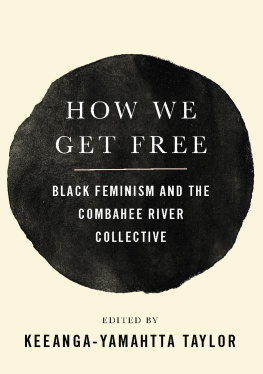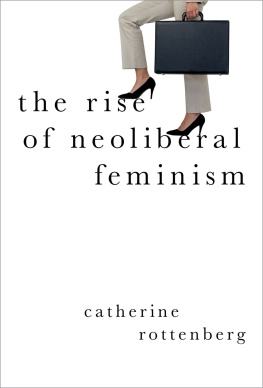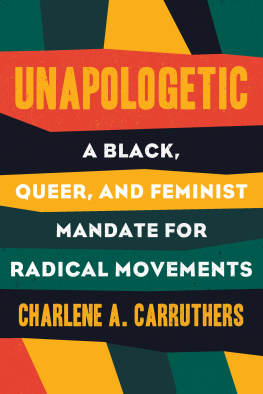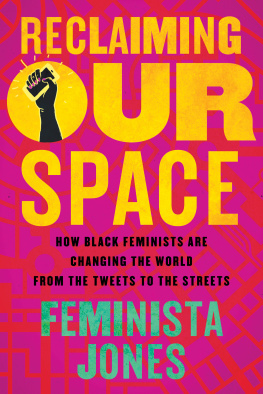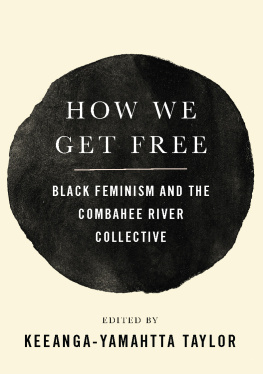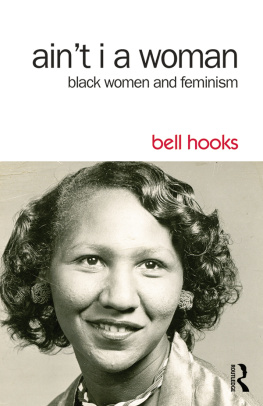Cover photo of Barbara Smith by Vicki Smith.
Published by State University of New York Press, Albany
2014 State University of New York
All rights reserved
Printed in the United States of America
No part of this book may be used or reproduced in any manner whatsoever without written permission. No part of this book may be stored in a retrieval system or transmitted in any form or by any means including electronic, electrostatic, magnetic tape, mechanical, photocopying, recording, or otherwise without the prior permission in writing of the publisher.
For information, contact State University of New York Press, Albany, NY
www.sunypress.edu
Production by Ryan Morris
Marketing by Fran Keneston
Library of Congress Cataloging-in-Publication Data
Aint Gonna Let Nobody Turn Me Around: Forty Years of Movement Building with Barbara Smith / Alethia Jones and Virginia Eubanks, eds., with Barbara Smith
ISBN 978-1-4384-5115-2 (hc : alk. paper)
ISBN 978-1-4384-5114-5 (pbk. : alk. paper)
ISBN 978-1-4384-5116-9 (ebook)
2014947017
0 9 8 7 6 5 4 3 2 1
From Alethia
For my mother, grandmother, and Angela and the sacrifices they made.
For my sister, Tamara, if only
From Virginia
For my second family, the feminist activist community of the Capital Region of New York, for their integrity, fearlessness, and compassion.
From Barbara
For my sister, Beverly, and everyone who takes a stand for justice.
Foreword
Im a part of the womens movement that doesnt really get that much play, even to this day, because its the part of the womens movement that pushes for looking at how capital and imperialism ruined the lives of virtually everyone on the planet except for the members of the ruling class and a few people who benefit from the crumbs.
Barbara Smith, interview by Loretta J. Ross,
May 78, 2003, Voices of Feminism Oral History
Project, Sophia Smith Collection, Smith College
Barbara Smith is a revolutionary. There is no other way to put it. Yes, she is recognized as a singular voice in the womens movement and one of the most important Black feminists on the planet. Yes, she is a pioneer of independent progressive publishing and a founder of Black womens studies. Yes, she is a long-time lesbian activist committed to social transformation, not just marriage equality and mainstream acceptance of the LGBT community. And yet, anyone who knows Barbara Smith and has followed her work over the past four decades understands that these categories as they are commonly understood do not fully capture the range of her thought and activism. To suggest that she is more is not to diminish Black feminism but rather to insist that Smiths own definition of Black feminism goes to the root of oppression and power and seeks ways to end all forms of exploitation, redistribute power, and transform society. Her description of the Combahee River Collectives objective perfectly articulates her vision of Black feminism: an antiracist, feminist practice with a radical, anticapitalist analysis. So it should not surprise us that Barbara Smith has played an active role in the most important movements and intellectual developments of our time: she fought for Civil Rights, human rights, peace, environmental justice, stood on the front lines against apartheid and all forms of racism, against U.S.-backed death squads in Central America and all forms of imperialism, against police brutality and all forms of state violence, against poverty and all efforts to deny people a living wage, welfare, and housing. And she played a central role in the formation of ethnic studies, womens studies, sexuality and gender studies, and queer theory. Despite these monumental accomplishments and an unparalleled record of struggle, she has only recently begun to receive the critical attention she deserves. This extraordinary collection of interviews and conversations will send a new generation scouring the internet in search of Smiths oeuvre.
I first discovered Barbara Smith around 1982 in my university library, before there was an internet. As a student at Cal State Long Beach, I practically lived between two call numbers: E 185, where all the African American studies books resided, and HXhome to books on Marxism. It was on those shelves, some place around E 185.86, that I came across a book titled All the Women Are White, All the Blacks Are Men, But Some of Us Are Brave: Black Womens Studies , edited by Gloria T. Hull, Patricia Bell-Scott, and Barbara Smith. The cover photo, dating back to the early twentieth century, depicted two fierce Black women in matching plaid outfits and elaborate hats, looking straight into the camera. One of the women sported what appeared to be a mans necktie and belt. I discovered the book just about the time I declared Black studies my minor and history my major.
Finding that book was both unsettling and exhilarating. In those days, Black studies at Long Beach State was run by hardcore Black nationalists and was considered a masculine endeavor. Most of my professors used the Black man and the White man as shorthand for describing Americas racial terrain. Many of us were also concerned about the epidemic of racist police violence. The same year Smith and her coeditors released But Some of Us Were Brave , Long Beach State was at the center of controversy when a fellow student and star football player named Ron Settles was found dead in a holding cell in Signal Hill, California, a tiny township encircled by the city of Long Beach. Settles had been arrested the night before while driving through Signal Hill and charged with cocaine possessiona strange charge in light of the fact that he had no prior history of drug use. According to the police departments official narrative, a distraught Settles mysteriously obtained a blunt object, beat himself, and then hanged himself in his cell. Of course, the police assaulted and killed Black women, too, but to my peers at the time, Black men were the targets, the endangered species.
It is not as if Black women were invisible. As nationalists, we had posters of Namibian and Angolan women with babies on their backs and AK-47s strapped to their shoulders, though we lacked the theoretical sophistication to recognize how these posters ultimately reinforced patriarchy by depicting women militants as primarily responsible for motherhood and the domestic sphere. Black women writers also achieved unusual prominence around this time: Alice Walkers The Color Purple appeared in 1982, along with Gloria Naylors The Women of Brewster Place and Audre Lordes Zami: A New Spelling of My Name . Toni Morrison had been publishing novels for a decade, Michele Wallaces controversial Black Macho and the Myth of the Superwoman appeared three years earlier, and in 1981 Angela Davis released Women, Race, and Class.


